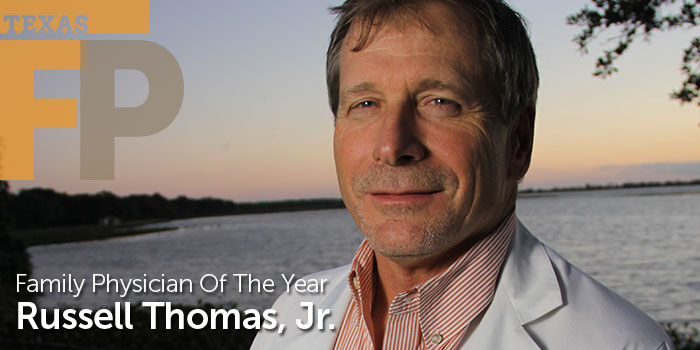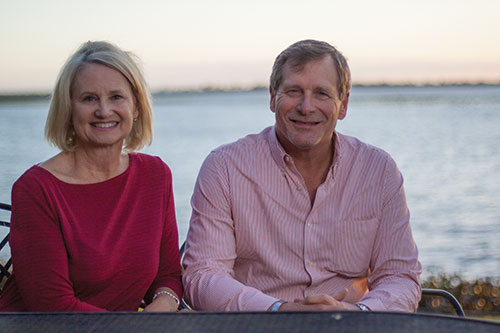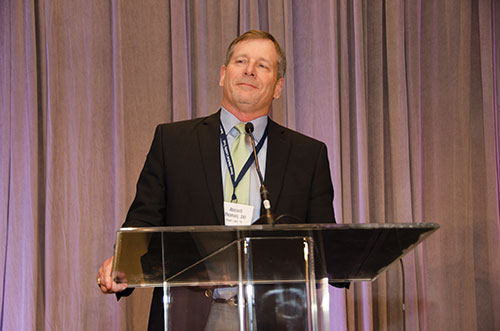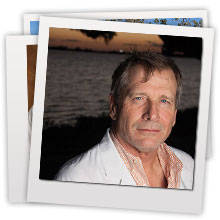Thank God I'm a Country Doc

Thank God I’m a country doc
Story and photos by Samantha White
“This is where I’m from.”
The simplest of answers. When asked why he returned to his hometown of Eagle Lake, Texas, to practice medicine, Russell Thomas, Jr., DO, MPH, only needs those few words. It’s as simple as that. It made no sense to practice anywhere else but in the place he grew up, surrounded by the family and friends he knew so well, giving back to the community that helped raise him.
Thomas, the 2014-2015 Texas Family Physician of the Year, practices at Rice Medical Associates, caring for the very people he grew up with. In a quaint town 60 miles west of Houston with a population of 3,700, Thomas not only knows most of the Eagle Lake residents, but he knows their life histories. What house they were raised in. What position they played on the high school football team. Where they work. Who they married. He knows their parents, too. And what careers they had or have. He knows their children. And maybe their grandchildren. In fact, he probably delivered many of their children and grandchildren.
If Thomas himself didn’t deliver them, there’s a good chance his father did. The late Raymond Thomas, MD, was also a family physician in Eagle Lake and was also awarded the Texas Family Physician of the Year title in 1997. Thomas is the only second generation Physician of the Year award recipient in TAFP’s history.
Growing up in Eagle Lake with one of the town’s few physicians as a father meant assisting him at the age of 16, cutting high school class to scrub in for surgery, and joining him on emergency visits just to spend some time together as father and son. These experiences combined with seeing his dad serve their community led Thomas to family medicine.
“I didn’t appreciate that there was anything else,” Thomas says. “I never imagined doing anything else.”
His mind was so set on being a physician and returning to Eagle Lake to practice alongside his father that when he failed to get into medical school, it was “like a slap in the face.” When by April he had not heard from the medical schools he had applied to, Thomas decided to pursue his master’s degree in public health.
Two weeks after finishing his degree at the University of Texas School of Public Health at Houston in 1976, Thomas married his longtime sweetheart, Robin. He went through the medical school application process again and was accepted to the Texas College of Osteopathic Medicine. He received his DO in 1980 and completed a residency at Southwest Memorial in Houston, now known as Memorial Hermann Southwest Hospital. He and Robin moved back to Eagle Lake and Thomas joined his father’s practice, an experience he calls a “17 year fellowship.”
“Dad and I had a great relationship,” Thomas says. “I think we were complementary in that he had a lot of surgical skills and 30 years of experience when I came in. I had some of the newer medicine techniques. We really had a good synergy. We were just a good team.”
Having previously nominated his father and a few other colleagues for this award, Thomas knows he is in good company as Physician of the Year.
“To be held to the same standard of esteem as he was really does mean a lot to me. I knew a lot of these older docs, they were guys my dad hung out with growing up. They were kind of that same country doctor mold, and to be included with those guys…I can’t think of a higher honor.”
Thomas’ work ethic and loyalty to the integrity of medicine was passed down from his physician father. When Thomas was born in 1953, the Salk polio vaccines were going through the final stages of human trials and physicians were excited about it. While interning at Fort Worth’s City-County Hospital, Thomas’ father took two doses of the vaccine home for his wife and a newborn Thomas. Before he could administer the vaccines, his conscience got the best of him and he returned the doses to the hospital. Two years later, Thomas was diagnosed with polio.
As ironic as it is, Thomas says if he could have a “do over” in life, he would not change his polio diagnosis.
“To be held to the same standard of esteem as he was really does mean a lot to me. I knew a lot of these older docs, they were guys my dad hung out with growing up. They were kind of that same country doctor mold, and to be included with those guys…I can’t think of a higher honor.” – Russell Thomas, Jr.
“Polio has never been a cause for me,” Thomas says. “I chose for it not to be the focus of my life. It’s never really even been much of an elephant in the room. It didn’t stop me from going to medical school or doing my residency. It didn’t stop me from doing any of the important things.”
Thomas’ childhood friend, Russ Krienke, MD, nominated Thomas for the award. He says that Thomas “chose to let his childhood polio become a motivation for success rather than an excuse for failure.” Krienke would know, as he was the friend who stayed by Thomas’ side when he was unable to participate in summer activities because of the latest cast or surgery. Instead of self-pity stories about missing out on childhood events, Thomas tells stories about Russ skipping a season of little league to instead sneak into his hospital room so the two friends could hang out.
Polio probably has something to do with Thomas’ ability to talk to patients so personally. As a child he was in and out of hospitals almost constantly.
“I’ve had surgeries so I know what being operated on is all about,” Thomas says. “Hopefully it has made me —having been on both sides of the patient fence—I’ve been more understanding and compassionate.”
According to patients, “understanding and compassionate” understate Thomas’ bedside manner. Ask patients, family, or colleagues, what makes Thomas Physician of the Year material and you’ll get the same answer: He truly cares. About his patients, his colleagues, his community, the practice of family medicine, the durability of rural medicine. He often acts as emcee at local events because he’s a great public speaker. He is an advocate for rural medicine because he cares about small communities and seeing that there are enough physicians to go around. He covers for colleagues when their children have activities because he reveres family values. He is a senior warden at his church because he holds faith dearly. He is also known for his tender bedside manner and the personal touch he brings to the exam room.
“For me, he’s so personable,” says longtime patient Susan Hadley. Thomas and Hadley grew up together in Eagle Lake and raised children there simultaneously. “I can call him or text him and he is right there to talk to me on the spot. He’s always there when I need him.”
Hadley has multiple stories of Thomas coming to her family’s rescue. He handled her mother’s admission into hospice care on the same day Hadley had back surgery. He answers her phone calls and texts always, even on his days off. He diagnosed her lupus in 1991. His father delivered both of her sons. The Thomas family is an extension of her family.
Thomas’ son Barrett attended West Point and is a major and a battalion operations officer at Fort Bliss. His daughter Jacqueline is a nurse in North Carolina. Both of Thomas’ children got their desire to serve the public from their father, who got the same desire from his own father.
Jacqueline says she has worked with physicians who are not as personal with their patients and calls her dad’s bedside manner a “true gift.” Not to mention the strong connection he shares with his patents.
“I’ve worked at Duke Hospital and I would see physicians come in, see patients for three minutes, leave, and never see them again,” she says. “Dad spends time with his patients. I don’t know if he even has the time, but he makes time to get to know them. He would go to a football game so he could see them play and talk about other things that go on in their lives. In a big city you just don’t have that opportunity. Everywhere you go in Eagle Lake, everyone knows him.”
Jacqueline also recalls doing hospital rounds as a child with her dad, much like he did with her grandfather, as a way to spend time together. They were going to the hospital to check in on a patient who had recently given birth. She was craving a Dairy Queen Blizzard so Thomas and Jacqueline stopped on their way to pick one up for her.

Thomas sits with his wife Robin on their lakefront back porch.
“Typical dad, just doing a little extra. He didn’t think it was a big deal though.”
Another friend and patient of Thomas’ describes him as a physician who can handle the “extraordinary.”
“I know his ability to immediately understand and act upon something entirely out of the norm of family practice saved my life,” the patient says.
One day, the patient stopped by the Thomas household, something not at all uncommon, to show Thomas a serious redness on his leg. He was told to go home, rest, and call Thomas if he developed a fever. A few hours later when his fever spiked, Thomas met him at the hospital and began treatment immediately. It was vibrio vulnificus, a flesh-eating bacterium the patient contracted after wade fishing in the Gulf. After a few days of being treated by Thomas in the hospital, the infection stopped spreading.
What’s interesting is that whether you talk to a colleague, a patient, or even an acquaintance, everyone adds that they would consider Thomas a friend. It’s easy to spot if you spend even the smallest amount of time in Eagle Lake. Join him at Subway for lunch and he’ll know the employees as well as the other patrons. Stop in the town’s small supermarket and the cashier undoubtedly has stories about him. He’s the peoples’ physician.
Yet another patient mentions in his award nomination letter that he continues to see Thomas for routine exams and non-emergency care, despite living 114 miles from Eagle Lake in Taylor, Texas.
“In this time and age of specialties and specialists,” this patient writes, “it is a blessing to have someone like Dr. Russell who is always willing to put others first, investing his time and resources to help others.”
He goes on to say that Thomas also delivered two of his daughters, one of whom currently studies medicine at TCOM in the rural track and is mentored by Thomas. That is what Thomas hopes for the future of medicine – that rural rotations and educational tracks become more common and popular and would include things like obstetrics and inpatient care.
Medicine for Thomas was never about a paycheck or any kind of ego-boosting recognition. It has always been about the patients and the integrity of rural family medicine. The Thomas family did leave Eagle Lake for a short time. He took a position in Austin from 2000 to 2002 as the program director at the Central Texas Medicine Foundation Family Practice Residency Program, where he helped establish a rural rotation. Knowing the importance of a rural physician, or “country doc” as Thomas calls it, this rotation was an important accomplishment to Thomas.
“To do family medicine you have to do family,” says Thomas. You have to know what’s going on in a patient’s life outside of the exam room to fully take care of them, he explains. You have to know about their job, their family, their home life.
“And in the case of a country or rural physician, you really have to be willing to say, ‘I’m going to commit to not just this practice and not just these patients but to this community.’ You’ve got to be willing to be available and to serve on things and do that kind of stuff.”
In Eagle Lake, Thomas is the epitome of a country doc. Many of his patients were schoolmates growing up. Many are his closest friends and relatives. His clinic manager is the sister of one of his childhood friends. Many members of his office staff and nursing staff come from a single family.
Being a country doc in the time of his father’s early practicing years was similar to what it is now, but on a grander scale. Thomas’ mother, Elfe, talks about her late husband making multiple house calls a day, something Thomas still does but mostly on an as-needed basis. She remembers before EMS existed in Eagle Lake her husband being called away from the house at all hours of the night to tend to accident victims. He once took care of a pet monkey who had a broken leg. It was typical of him to call the telephone company and have them contact the nurses or lab technicians he needed to meet him at the clinic.
“To do family medicine you have to do family… And in the case of a country or rural physician, you really have to be willing to say, ‘I’m going to commit to not just this practice and not just these patients but to this community.’ You’ve got to be willing to be available and to serve on things and do that kind of stuff.” – Russell Thomas, Jr.
Thomas has comparable stories of picking up nurses in his own truck and heading to accidents he heard about via small-town chatter.
“I think that you have to have a certain mindset,” says Thomas, “and you have to be of a certain nature to do rural medicine.”
TAFP CEO Tom Banning has known Thomas for the duration of his career with the Academy. The two consider each other more than colleagues now, playing golf when they can.
“Dr. Thomas embodies the role of a physician leader and advocate. He’s the real deal.” Banning says. “Throughout his career he has made his voice heard on issues affecting patients and the practice of medicine. He’s developed and cultivated relationships with those in positions of power who have a great deal of influence on medicine. He is an unwavering advocate for his patients and his specialty.”
Other physician educators see his dedication to the specialty too. In one nomination letter, a colleague says that medical students being mentored by Thomas are all inspired by his service to his community and have the upmost respect for him.
“He has been highly rated as an educator,” she says, “and has provided all of the necessary time and effort on a volunteer basis, believing in his responsibility to give back to the profession as his trainers gave of their time and effort in his training.”
A physician colleague calls Thomas an “exemplary role model for young physicians-in-training” in her nomination letter. “Dr. Russell’s efforts on behalf of his students and patients is indefatigable,” she says.
Practicing in Eagle Lake is, of course, not the only thing Thomas does in the medical realm. He is a preceptor for medical students interested in family medicine and has clinical appointments with the UT Houston School of Medicine and Texas College of Osteopathic Medicine. He was appointed to the Board of Medical Examiners and served for eight years, five of which were spent as the vice president. He was elected to the Board of Directors for the Federation of State Medical Boards. He was appointed to the Board of Directors for the Accreditation Council for Continuing Medical Education and to the Maintenance of Licensure Committee for the American Board of Medical Specialties. Suffice it to say, he’s just as busy outside of the clinic as he is inside with his patients.
These experiences outside of the exam room are part of what Thomas’ wife, Robin, thinks makes him a great doctor and worthy of the Physician of the Year award.
“Russell is a great, wonderful doctor,” says Robin. “He works hard and has been involved in many aspects of medicine. I think it’s a combination of that and that he’s very dedicated. He’s very caring.”

Thomas accepts the Texas Family Physician of the Year award at TAFP’s Annual Session and Scientific Assembly in July 2014.
Thomas swears there hasn’t been a day since he returned to Eagle Lake that he was unhappy to go to work in the morning, which is clear after seeing him in action with patients.
“For most of the last 31 years I’ve had the privilege of taking care of people in my hometown,” he says.
As a typical country doc, Thomas practices cradle-to-grave medicine. When a close family friend was diagnosed with cancer, Thomas was part of the team of physicians who treated her. He delivered her children and had been their family physician for decades. The night she passed away, Thomas sat with her, the two reminiscing to 25 years earlier when he delivered her first child.
“That’s the length and breadth in family medicine in one patient,” says Thomas. “I consider it sort of a privilege to be there for these people when they die. They allow me into their lives to deliver them and bring life in, and they allow me to be there at the end. That’s a big deal.”
Thomas captivated the audience with his speech when he accepted the award in July 2014, proudly recounting his history as a country doc. He ended by telling his fellow physicians, “I encourage you as we leave today to remember that we’re all the Physician of the Year in the eyes of our patients.”
